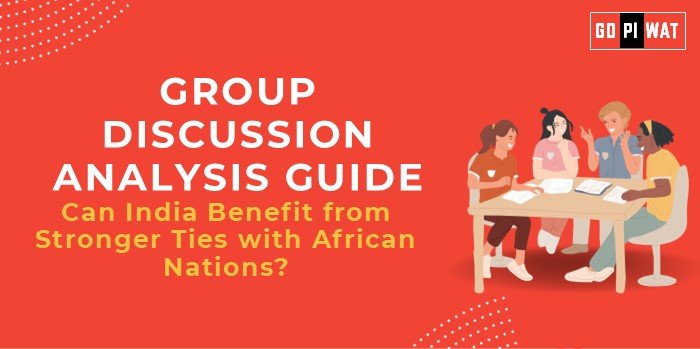📋 Group Discussion (GD) Analysis Guide: Can India Benefit from Stronger Ties with African Nations?
🌐 Introduction to the Topic
Opening Context: India and Africa share historical, cultural, and economic ties that date back centuries. Strengthening this relationship could redefine global trade, development, and geopolitical alliances. For B-school students, understanding this topic offers a rich perspective on international relations, trade policies, and developmental economics.
Topic Background: The India-Africa partnership is built on shared challenges and opportunities, including sustainable development, trade, and combating climate change. India is Africa’s fourth-largest trading partner, with trade exceeding $90 billion in 2023. However, there is immense untapped potential in sectors like renewable energy, technology, and education.
📊 Quick Facts and Key Statistics
- 📈 India-Africa Trade Volume: $90 billion (2023) – Reflects the growing economic engagement.
- 🌍 Population Synergy: Africa’s 1.4 billion and India’s 1.4 billion people together constitute over a third of the global population.
- 🏗️ Infrastructure Investments: $7.4 billion by India through Lines of Credit since 2004.
- 💊 Key Exports from India: Pharmaceuticals and engineering goods – Showcasing India’s industrial advantage.
- 🔋 Renewable Energy Potential: Joint efforts under the International Solar Alliance aim for significant gains in energy security.
🧩 Stakeholders and Their Roles
- 🇮🇳 Indian Government: Facilitates trade agreements, Lines of Credit, and collaborative initiatives like ITEC (Indian Technical and Economic Cooperation).
- 🌍 African Governments: Offer access to resources, markets, and workforce.
- 🏢 Private Companies: Engage in technology transfer, manufacturing, and agricultural projects.
- 💼 Global Organizations: UN and World Bank support India-Africa cooperation for sustainable development goals.
🏆 Achievements and Challenges
- 🌟 Achievements:
- Economic Growth: India is Africa’s fourth-largest trading partner, with trade showing a steady rise.
- Capacity Building: Over 50,000 African students trained in India under the ITEC program.
- Healthcare Advancements: Affordable Indian pharmaceuticals support Africa’s healthcare needs.
- Renewable Energy: International Solar Alliance includes 27 African nations.
- ⚠️ Challenges:
- China’s Influence: China’s massive investments dwarf India’s.
- Logistical Barriers: Weak infrastructure limits trade scalability.
- Geopolitical Risks: Political instability in some African nations poses challenges.
🔍 Global Comparisons
- 🌏 China-Africa Trade: $254 billion (2023), showcasing higher engagement.
- 🎓 India-Africa Education Initiatives: Comparable to China’s Confucius Institutes but need expansion.
📖 Case Studies
- 📡 India’s E-VBAB Network: Boosts telemedicine and education in 54 African nations.
- 🔋 Kenya-India Solar Projects: Pioneering renewable energy partnerships.
🖋️ Structured Arguments for Discussion
- ✅ Supporting Stance: “India-Africa ties strengthen trade, energy security, and geopolitical balance against China.”
- ❌ Opposing Stance: “India’s investment in Africa lacks the scale and strategic focus needed to counter competitors like China.”
- ⚖️ Balanced Perspective: “While India-Africa ties show promise, addressing logistical and geopolitical challenges is crucial for sustained impact.”
💡 Effective Discussion Approaches
- 📜 Opening Approaches:
- “Africa’s $90 billion trade with India is significant, but the potential for economic collaboration remains untapped.”
- “India and Africa together represent over one-third of the global population, yet their partnership faces strategic challenges.”
- 🎯 Counter-Argument Handling:
- Emphasize India’s unique strengths, like soft power and democratic values.
- Propose actionable solutions, such as increased investment in infrastructure.
🔍 Strategic Analysis of Strengths and Weaknesses
- 📈 Strengths: Historical ties, growing trade, renewable energy partnerships.
- ⚠️ Weaknesses: Limited financial scale, weaker logistical networks.
- 🌟 Opportunities: Collaboration in healthcare, education, and technology.
- ⚡ Threats: Competition from China and other global players.
📄 Connecting with B-School Applications
- 🌍 Real-World Applications:
- Trade and Operations: Building case studies on India-Africa supply chain models.
- Development Economics: Analyzing renewable energy collaborations for sustainability.
- 💡 Sample Interview Questions:
- “How can India overcome China’s influence in Africa?”
- “Evaluate India-Africa ties from an economic and geopolitical perspective.”
- ✨ Insights for B-School Students:
- Explore Africa’s potential as a consumer market for Indian businesses.
- Study India’s renewable energy and healthcare initiatives in Africa.


